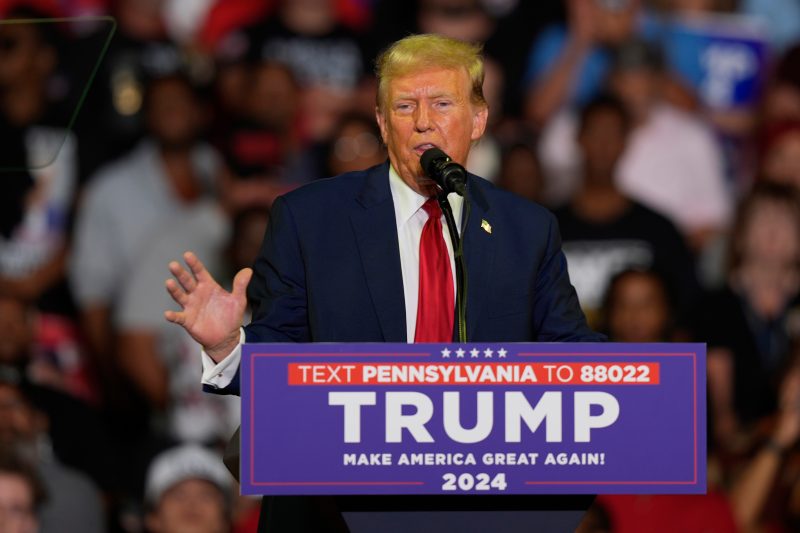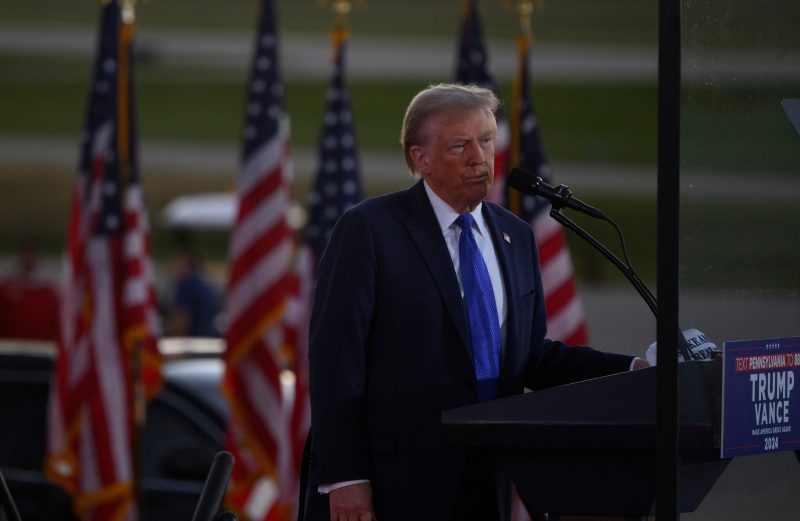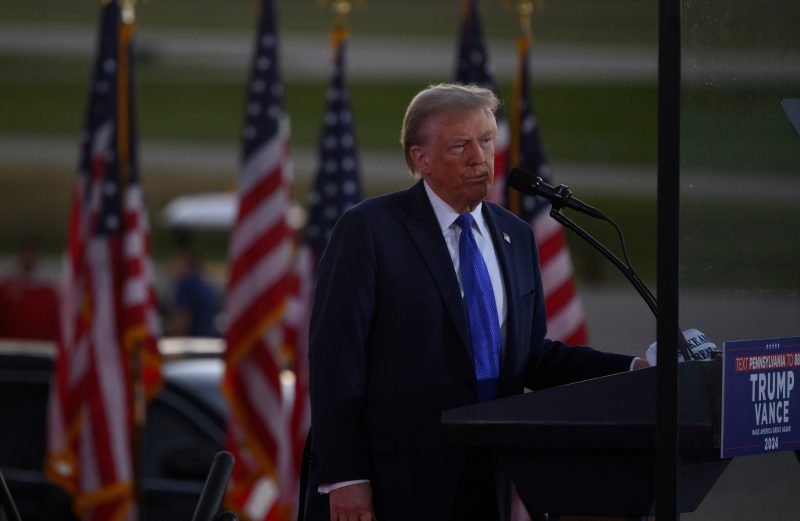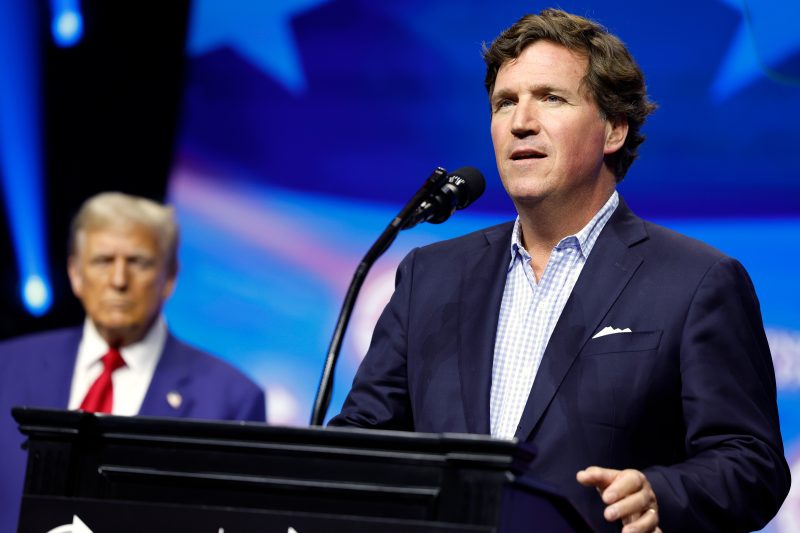
What is Project 2025?
An update: Project 2025 just announced that it was going to stop creating policies, and that its director, a former Trump administration official, was leaving, The Washington Post’s Isaac Arnsdorf and Josh Dawsey report. Trump campaign, they report, is “furious” at the way Project 2025 has linked itself to Trump and how it has been received in the media. It’s not clear what that means for the initial 900-page plan, nor what it would mean for a second Trump presidency, since many of the ideas in Project 2025 are ideas Trump has endorsed and were put forward by close advisers or people who worked in his administration.
If Donald Trump struggled somewhat in his first administration to move the country dramatically to the right, he’ll be ready to go in a second term.
That’s the aim behind Project 2025, a comprehensive plan by former and likely future leaders of a Trump administration to remake America in a conservative mold while dramatically expanding presidential power and allowing Trump to use it to go after his critics.
The plan is gaining attention just as Trump is trying to moderate his stated positions to win the election, so he’s criticized some of what’s in it as “absolutely ridiculous and abysmal” and insisted that neither he nor his campaign had anything to do with Project 2025.
Still, what’s in this document is a pretty good indicator of what a second Trump presidency could look like. Here’s what Project 2025 is and how it could reshape America.
It’s a blueprint for a second Trump administration
The centerpiece is a 900-page plan that calls for extreme policies on nearly every aspect of Americans’ lives, from mass deportations, to politicizing the federal government in a way that would give Trump control over the Justice Department, to cutting entire federal agencies, to infusing Christian nationalism into every facet of government policy by calling for a ban on pornography and promoting policies that encourage “marriage, work, motherhood, fatherhood, and nuclear families.”
This isn’t coming directly from the Trump campaign. But it should be taken seriously because of the people who wrote it, analysts say. The main organization behind the plan, the Heritage Foundation, is a revolving door for Trump officials (and Heritage is a sponsor of the Republican National Convention, which will hand him the nomination next week).
“This is meant as an organized statement of the Trumpist, conservative movement, both on policy and personnel, and politics,” said William Galston, head of governance studies at the Brookings Institution.
Project 2025 calls for abortion limits, slashing climate change and LGBTQ health care funding, and much more
A few of the highlights:
Remake the federal workforce to be political:Instead of nonpartisan civil servants implementing policies on everything from health to education and climate, the executive branch would be filled with Trump loyalists. “It is necessary to ensure that departments and agencies have robust cadres of political staff,” the plan says. That means nearly every decision federal agencies make could advance a politicalagenda — as in whether to spend money on constituencies that lean Democratic. The project calls for cutting LGBTQ health programs, for example.
Cut the Education Department: Project 2025 would make extensive changes to public schooling, cutting longtime low-income and early education federal programs like Head Start, for example, and even the entire Education Department. “Federal education policy should be limited and, ultimately, the federal Department of Education should be eliminated,” the plan reads.
Give Trump power to investigate his opponents: Project 2025 would move the Justice Department, and all of its law enforcement arms like the FBI, directly under presidential control. It calls for a “top-to-bottom overhaul” of the FBI and for the administration togo over its investigations with a fine-toothed comb to nix any the president doesn’t like. This would dramatically weaken the independence of federal law enforcement agencies. “There’s going to be an all-out assault on the Department of Justice and the FBI,” said Galston, of Brookings. “It will mean tight White House control of the DOJ and FBI.”
Make reproductive care, particularly abortion pills, harder to get: It doesn’t specifically call for a national abortion ban, but abortion is one of the most-discussed topics in the plan, with proposals throughout encouraging the next president “to lead the nation in restoring a culture of life in America again.” It would do this by prosecuting anyone mailing abortion pills (“Abortion pills pose the single greatest threat to unborn children in a post-Roe world,” the plan says). It would raise the threat of criminalizing those who provide abortion care by using the government to track miscarriage, stillbirths and abortions, and make it harder to get emergency contraceptive care covered by insurance. It would also end federal government protections for members of the military and their families to get abortion care.
Crack down on even legal immigration: It would create a new “border patrol and immigration agency” to resurrect Trump’s border wall, build camps to detain children and families at the border, and send out the military to deport millions of people who are already in the country illegally (including dreamers) — a deportation effort so big that it could put a major dent in the U.S. economy. “Illegal immigration should be ended, not mitigated; the border sealed, not reprioritized,” the plan says.
Slash climate change protections:Project 2025 calls for getting rid of the National Oceanic and Atmospheric Administration, which forecasts weather and tracks climate change, describing it as “one of the main drivers of the climate change alarm industry.” It would increase Arctic drilling and shutter the Environmental Protection Agency’s climate change departments, all while making it easier to up fossil fuel production.
Ban transgender people from the military and consider reinstating the draft: “Gender dysphoria is incompatible with the demands of military service,” it reads. The author of this part of the plan led the Defense Department at the end of Trump’s presidency, and he told The Washington Post that the government should seriously consider mandatory military service.
How all of this would be implemented
A huge part of this project is to recruit and train people on how to pull the levers of government or read the law in novel ways to carry out these dramatic changes to federal policy. There’s even a place on the plan’s website where you can submit your résumé.
But there are some major hurdles to getting the big stuff done, even if Trump and Republicans win control of Washington next year. For one, Trump doesn’t appear to agree with everything in it. His campaign platform barely mentions abortion, while Project 2025 zeroes in on it repeatedly.
Also, some of these ideas are impractical or possibly illegal. Analysts are divided about whether Trump can politicize the civil workforce to fire them at will, for example. And the plan calls for using the military to carry out mass deportations on a historic scale, which could be constitutionally iffy.
Ominously, one of the project’s leaders opened the door to political violence to will all of this into being: “We are in the process of the second American revolution,” Heritage Foundation President Kevin Roberts warned recently, “which will remain bloodless, if the left allows it to be.”
Why Project 2025 is getting so much attention right now
It’s not unusual for wannabe administration officials to plan for how they’d govern once they get back in power. But what is unusual is how dramatic and unapologetically extreme many of these proposals are.
And the Biden campaign — which is obviously struggling right now with existential questions about its nominee — sees this as an easy target to campaign on.
Democrats are circulating a survey from a liberal organization that suggests talking about Project 2025 as a “takeover” of American government by Trumpists resonates with voters.
“It’s like reading a horror novel,” said Democratic strategist Jesse Ferguson. “Each page makes you want to read the next one, but when you finish reading it, you’re scared and disgusted.”
That’s much to the frustration of the Trump campaign, which doesn’t want such specific (and politically unpopular) ideas out there pegged to his campaign, as he’s trying to moderate some of his positions to win the election.
“It makes no sense to put all the crazy things you’ll be attacked for down on paper while you’re running,” a Trump adviser told The Washington Post recently.
But it’s fair to think of Project 2025 as a pretty good indicator of what a second Trump presidency would look like, analysts say.
“It’s not like Trump is going to hand out this booklet to his Cabinet on Day One and say, ‘Here you go,’” said Michael Strain, the director of economic policy studies at the conservative-leaning American Enterprise Institute. “But it reflects real goals of important people in Trump’s community.”
A previous version of this article misspelled the name of the American Enterprise Institute’s Michael Strain as Michel. The article has been corrected.



